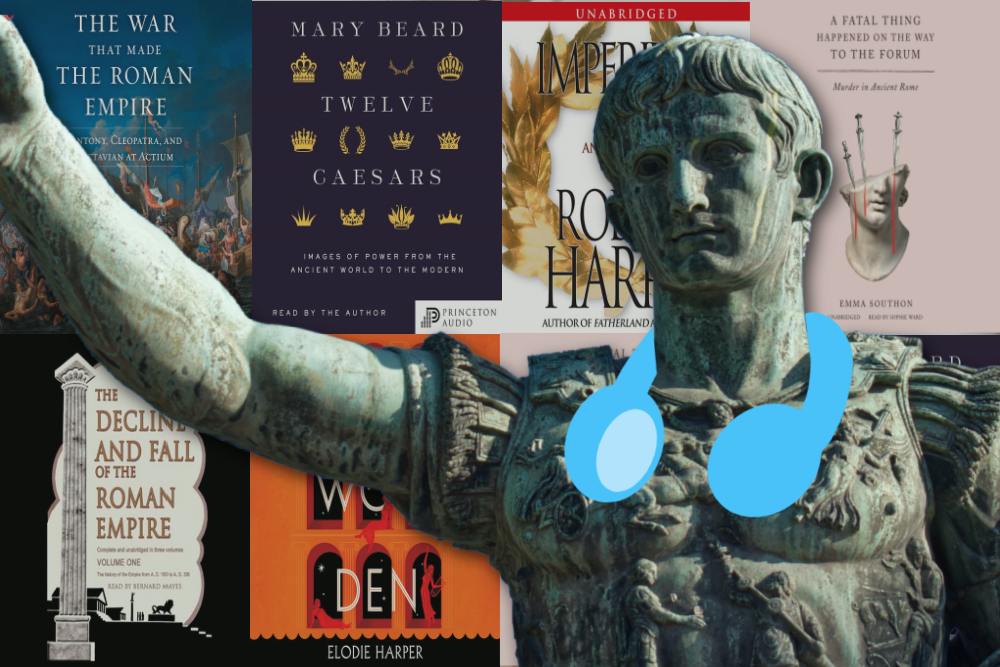
Lend me your ears! Add these Roman Empire audiobooks to your digital library today

Back in November right around Veterans Day, a black kitten showed up on our doorstep. Despite already having four cats, my husband and I took the kitten in. Initially told she was female, we named her Juno after the Roman Goddess. See, when my husband was in college a black kitten showed up on the doorstep of the house he shared with his friends right around Veterans Day, and they named him Caesar. Post-graduation, Caesar lived a long, happy life with my in-laws and we wanted to carry on with the Roman nomenclature.
(A few months later we learned Juno is actually male but the name has remained.)
Needless to say, when I asked my husband how often he thinks about the Roman Empire, I somewhat knew what to expect.
If you’re looking to give the friends, Romans, countrymen (and women and nonbinary folks) in your community more books about the Roman Empire look no further. Our Digital Content Librarians have put together a list in Marketplace of titles all about the Roman Empire you can shop here. Read on for some audiobook highlights from the list!
Audiobooks about the Roman Empire
The Decline and Fall of the Roman Empire by Edward Gibbon (narrated by Bernard Mayes)
Buy the audiobook of Volume 1 here
Buy the audiobook of Volume 2 here
Considered one of the finest historical works in the English language, The Decline and Fall of the Roman Empire is lauded for its graceful, elegant prose style as much as for its epic scope. Remarkably accurate for its day, Gibbon’s treatise holds a high place in the history of literature and remains an enduring subject of study.
This first volume covers AD 180 AD to AD 395, which includes the reign of Augustus, the establishment of Christianity, and the Crusades.
This second volume covers AD 395 to AD 1185, from the reign of Justinian in the East to the establishment of the German Empire of the West. It recounts the desperate attempts to hold off the barbarians, palace revolutions and assassinations, theological controversy, and lecheries and betrayals, all in a setting of phenomenal magnificence.
Imperium by Robert Harris (narrated by Oliver Ford Davies)
Buy the audiobook here
On a cold November morning, Tiro opens the door to find a terrified, bedraggled stranger begging for help. Once a Sicilian aristocrat, the man was robbed by the corrupt Roman governor, Verres, who is now trying to convict him under false pretenses and sentence him to a violent death. The man claims that only the great senator Marcus Cicero, one of Rome’s most ambitious lawyers and spellbinding orators, can bring him justice in a crooked society manipulated by the villainous governor. But for Cicero, it is a chance to prove himself worthy of absolute power. What follows is one of the most gripping courtroom dramas in history, and the beginning of a quest for political glory by a man who fought his way to the top using only his voice—defeating the most daunting figures in Roman history.
A Fatal Thing Happened on the Way to the Forum by Emma Southon (narrated by Sophie Ward)
Buy the audiobook here
In ancient Rome, all the best stories have one thing in common—murder. Romulus killed Remus to found the city, Caesar was assassinated to save the Republic. Caligula was butchered in the theater, Claudius was poisoned at dinner, and Galba was beheaded in the Forum. In one fifty-year period, twenty-six emperors were murdered.
But what did killing mean in a city where gladiators fought to the death to sate a crowd? In A Fatal Thing Happened on the Way to the Forum, Emma Southon examines a trove of real-life homicides from Roman history to explore Roman culture, including how perpetrator, victim, and the act itself were regarded by ordinary people. Inside ancient Rome’s darkly fascinating history, we see how the Romans viewed life and death and what it means to be human.
The Wolf Den by Elodie Harper (narrated by Antonia Beamish)
Buy the audiobook here
Amara was once the beloved daughter of a doctor in Greece, until her father’s sudden death plunged her mother into destitution. Now Amara is a slave and prostitute in Pompeii’s notorious Wolf Den brothel or lupanar, owned by a cruel and ruthless man. Intelligent and resourceful, she is forced to hide her true self. But her spirit is far from broken. Buoyed by the sisterhood she forges with the brothel’s other women, Amara finds solace in the laughter and hopes they all share. For the streets of the city are alive with opportunity—here, even the lowest-born slave can dream of a new beginning. But everything in Pompeii has a price. How much will Amara’s freedom cost her? The Wolf Den is the first in a trilogy of novels about the lives of women in ancient Pompeii.
The War that Made the Roman Empire by Barry Strauss (narrated by Jacques Roy)
Buy the audiobook here
Following Caesar’s assassination and Mark Antony’s defeat of the conspirators who killed Caesar, two powerful men remained in Rome—Antony and Caesar’s chosen heir, young Octavian, the future Augustus. When Antony fell in love with the most powerful woman in the world, Egypt’s ruler Cleopatra, and thwarted Octavian’s ambition to rule the empire, another civil war broke out. In 31 BC one of the largest naval battles in the ancient world took place—more than 600 ships, almost 200,000 men, and one woman—the Battle of Actium. Octavian prevailed over Antony and Cleopatra, who subsequently killed themselves.
The Battle of Actium had great consequences for the empire. Had Antony and Cleopatra won, the empire’s capital might have moved from Rome to Alexandria, Cleopatra’s capital, and Latin might have become the empire’s second language after Greek, which was spoken throughout the eastern Mediterranean, including Egypt.
Twelve Caesars by Mary Beard (narrated by the author)
Buy the audiobook here
What does the face of power look like? Who gets commemorated in art and why? And how do we react to statues of politicians we deplore? In this book—against a background of today’s “sculpture wars”—Mary Beard tells the story of how for more than two millennia portraits of the rich, powerful, and famous in the western world have been shaped by the image of Roman emperors, especially the “twelve Caesars,” from the ruthless Julius Caesar to the fly-torturing Domitian. Twelve Caesars asks why these murderous autocrats have loomed so large in art from antiquity and the Renaissance to today, when hapless leaders are still caricatured as Neros fiddling while Rome burns.
Visit Marketplace to add all these titles and more when you shop our Roman Empire list here.
Tags In
Browse blog and media articles
Public Library Training
K-12 Library Training